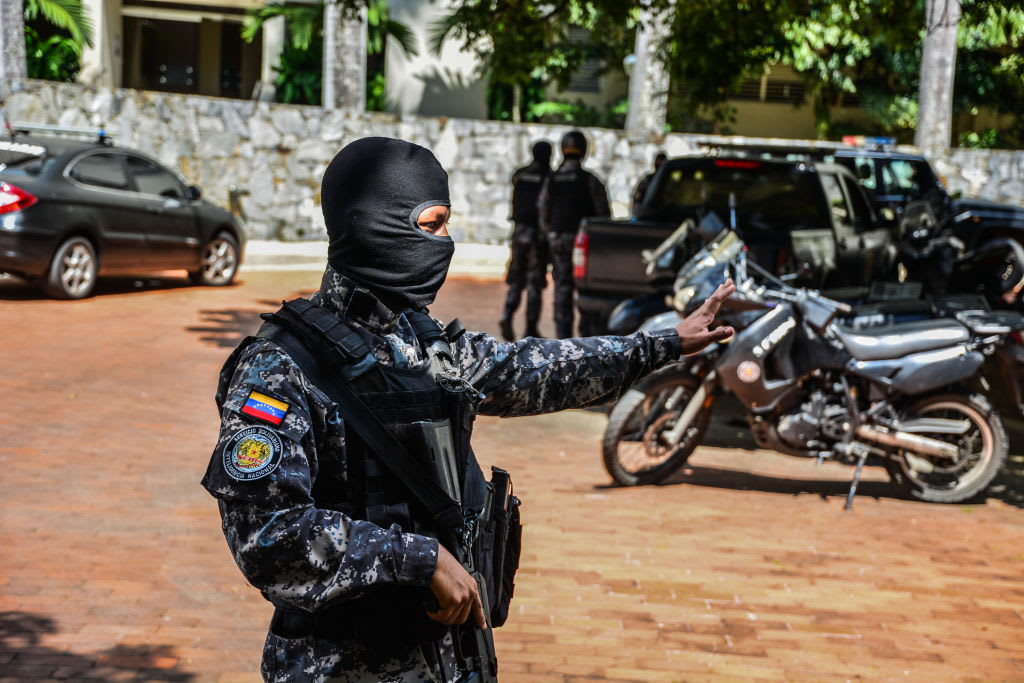Life at Gitmo
Editor's Note: On November 17th, 60 Minutes broadcast a story about the American military's detention facility at Guantanamo Bay, Cuba. Among the subjects covered in the report were prison conditions for both inmates and their military guards. In a short exchange between Lesley Stahl and the commander, Colonel John Bogdan, Bogdan stated that his soldiers suffered "almost twice" the incidents of PTSD as "regular aligned forces."
Today, the U.S. Southern Command issued the following correction:
COL Bogdan was mistaken about twice the level of PTSD among JTF personnel, a U.S. Army Personnel Health Command survey said the conditions there might contribute to increased levels of behavioral health issues. There are no statistics that support the claim of twice the number of troops diagnosed with PTSD. In 2011 the Army conducted a study of Soldiers assigned to Guantanamo Bay detention duty. Medical records were reviewed for 19 service members who were medically evacuated for a variety of behavioral health issues. Additionally, 1,590 service members who were assigned to Guantanamo Bay in January 2011 participated in a survey of occupational health and wellbeing. The survey revealed that these service members were nearly twice as likely (though not actually diagnosed) to screen positive for moderate to severe post-traumatic stress as Soldiers surveyed in previous studies who had recently redeployed from Iraq or Afghanistan.
COL Greg Julian
US Southern Command
Public Affairs Chief
The following script is from "Gitmo" which aired on Nov. 17, 2013. The correspondent is Lesley Stahl. Rich Bonin, producer.
If there's a heaven above and a hell below, then limbo can be found just 90 miles off the coast of Florida at the U.S. naval base at Guantanamo Bay, Cuba. There, prisoners who've been scooped up in the war on terror have remained locked up -- most for 11 years now without being charged. And it's cost taxpayers $5 billion so far.
Two weeks ago, we reported on the handful of the prisoners going on trial. Tonight, we'll tell you about the others, many of whom can't be tried. The evidence against them is weak or inadmissible, in some cases, because it was obtained through quote "enhanced interrogation techniques."
With Congress having mandated that none of the detainees can set foot on U.S. soil, and President Obama vowing to shut the prison down, life at Guantanamo Bay grinds on.
We were granted extraordinary access, particularly at the prison camp. You will see Gitmo, as it's called, like you've never seen it before.
The only way onto the naval base is by boat. We were ferried across the bay on a Coast Guard security vessel, armed with 50 and 30-caliber machine guns.
[Duckworth: Our standing order is: no one in, no one out. We will not let any vessel in unless it's properly vetted.]
The boats patrol 24 miles of oceanfront. The main concern: an al Qaeda saboteur staging an attack. The naval base is a speck of territory at the far eastern tip of Cuba, at its heart: the detention center.
[John Bogdan: Hey, John Bogdan. How ya doin?]
Army Colonel John Bogdan is the commander, in effect, the warden.
Lesley Stahl: So this is where all the detainees are housed?
John Bogdan: The bulk of them.
The facility is modeled after maximum-security prisons in the U.S. and yet it cost 35 times more here: at up to $2.7 million a year per prisoner.
Lesley Stahl: How many detainees in all in the whole facility?
John Bogdan: 164.
Lesley Stahl: And is Khalid Sheikh Mohammed and the 9/11 five right here in this part?
John Bogdan: No, they are in a separate facility for the high-value detainees.
Lesley Stahl: Is it a secret?
John Bogdan: It is. It's a classified location.
Lesley Stahl: Classified, so we can't see that?
John Bogdan: No, we can't.
Lesley Stahl: And how old is the oldest person here and the youngest person?
John Bogdan: The oldest, I believe, is 63, the youngest is around 30.
He took us onto one of the cell blocks where the detainees are kept in single cells.
John Bogdan: This is Bravo Block in Camp Five, which is generally where we put detainees that are on discipline status.
Shaker Aamer: I know that for a fact--
Lesley Stahl: That's one of the detainees talking?
John Bogdan: It is.
Lesley Stahl: In English?
John Bogdan: Yes.
Shaker Aamer: Please we are tired. Either you leave us to die in peace or either tell the world the truth. Open up the place, let the world come and visit!
It was rattling to hear a detainee's voice like that, so despairing - and to get such a raw sense of what it's like here.
Lesley Stahl: How much does this go on?
John Bogdan: Pretty much constantly.
Lesley Stahl: Constantly.
Shaker Aamer: Please, colonel, act with us like a human being, not like slaves.
Lesley Stahl: You know who he is, how long has he been here?
John Bogdan: Pretty much everybody we have here has been here since it first opened in '02 and '03.
Since he made such a ruckus, we wanted to find out more about him. He is detainee 239 whose name we have learned is Shaker Aamer. He was born in Saudi Arabia, but he became a resident of Great Britain.
Shaker Aamer: You cannot walk not even half a meter without being chained. Is that a human being? That's the treatment of an animal!
It turns out the Shaker Aamer case has reached all the way into 10 Downing Street in London.
This is a July 4th, 2013, letter from Prime Minister David Cameron saying "we want Shaker Aamer released and returned to the U.K. as a matter of urgency." Cameron also says that he has personally raised the case with President Obama.
Shaker Aamer: It's very sad what's happening in this place.
Clive Stafford Smith: Oh, I'd know that voice anywhere, yeah.
Clive Stafford Smith is Aamer's lawyer.
Clive Stafford Smith: What I've said and what Shaker said for years is if you've got any allegations against him, put up or shut up. But the mere fact-
Lesley Stahl: He's never been charged?
Clive Stafford Smith: Never been charged.
Lesley Stahl: And he's been sitting there how long?
Clive Stafford Smith: For 11 years.
Shaker Aamer has been accused of being a close associate of Osama bin Laden, which he denies. But like more than half of the detainees still here, he has been approved for transfer out of Guantanamo -- in his case, twice -- by military and intelligence officials under both President Bush and President Obama. So why is he still here? It's the conundrum of Guantanamo Bay. Everything gets stuck, sometimes for reasons that no one can explain.
Lesley Stahl: I'm trying to understand how a prisoner who's been cleared to leave twice with an appeal from a prime minister of a friendly country and he's still sitting there. I'm just trying to figure out why he's still there.
Clive Stafford Smith: And I think it's a fascinating question. And I would love a little more transparency.
Lesley Stahl: What's the official explanation?
Clive Stafford Smith: I wish someone official would give me an explanation. And they won't. No one will say why they won't let him go.
But he was not cleared for release. He was cleared for "transfer" - as this document shows, "subject to appropriate security measures..."
Lesley Stahl: If he did go back, would he be locked up again? Would he be monitored? Or would he just be a free man?
Clive Stafford Smith: Shaker has agreed to whatever conditions the British want to put on him, because he has nothing to hide.
Aamer was picked up in Afghanistan and was among the first detainees brought to Guantanamo Bay in 2002, when there was only one camp, X-Ray. It's closed now - overrun with weeds and banana rats -- and vestiges of the old interrogation rooms.
As more prisoners were brought here, so were more military and civilian personnel, now numbering 5,500.
So now there's a typical American suburb in Cuba with a McDonald's, an elementary school, soccer fields and iguanas - next to 17 miles of razor wire, guard towers and surveillance cameras everywhere.
Lesley Stahl: So this is the control room. What are they monitoring? What are they looking at?
John Bogdan: Well, they've got-- there's cameras in every cell.
Lesley Stahl: Every cell? Every single cell? You're watching everything
John Bogdan: Everything.
The compliant detainees are allowed to walk in and out of their cells to an outdoor recreation yard where many of them say their daily prayers, and then into a communal room where the detainees mingle with one another.
John Bogdan: What you're looking at right now, you can see just the top on one detainee there, he's at one of the tables.
Lesley Stahl: With his headphones on.
John Bogdan: Exactly. They watch TV and they also have a radio stations, satellite radio stations.
We're not allowed to show the faces of the detainees. We had to submit every bit of our video to military censors...
[Lesley Stahl: So what is it that you wanted us to cut out there.]
...who made us delete or blur out any faces that we accidentally recorded.
Col. Bogdan brought us to another cell block where the detainees locked in their cells began to protest the moment we arrived. It was the first time video cameras were allowed onto Echo block where detainees who have attacked guards are held. They banged and shook their steel doors with such force it was frightening and so deafening we couldn't hear each other. Col. Bogdan told us to walk as fast as possible.
Lesley Stahl: The guards were wearing splash masks over their faces and white overalls that I gather are disposables. I mean, what are they guarding themselves against?
John Bogdan: Generally guarding against being struck by, by what we call a splashing. Feces, urine, semen, blood, whatever the detainees can--
Lesley Stahl: They throw those out of those cells?
John Bogdan: They do.
Lesley Stahl: How often does that happen?
John Bogdan: Pretty much daily.
Lesley Stahl: When the banging started, I was under the impression that it was a protest directed specifically at the warden.
John Bogdan: Without a doubt, when I show up, it gets them spun a little bit more.
That's because when he became warden in 2012, he began cracking down which, the detainee's lawyers say, enflamed the situation. First he ordered a search of the cells, looking - he says -- for contraband -- and then a full-on raid.
John Bogdan: We had to send forces in. Get into the main floor here and secure the area.
Lesley Stahl: So a real operation, a military operation?
John Bogdan: Certainly. We had to physically come in and either physically restrain them. Get 'em on the ground, get 'em into the cells. After we entered the first block they seemed to get the idea that we were serious.
After the raid, a hunger strike swept across the facility.
Lesley Stahl: At the peak, I think there were 106 men, I mean that's almost two-thirds of everybody in the prison, the detention center, were refusing to eat. Why did they go on the hunger strike?
John Bogdan: Well, their primary complaint was to leave Gitmo.
Lesley Stahl: To just get out of here?
John Bogdan: Uh-huh (affirm).
Lesley Stahl: That makes sense.
John Bogdan: --that was-- that was what they were asking for.
Lesley Stahl: Yeah. And they wanted to get some international attention. And they did.
John Bogdan: Uh-huh (affirm).
Lesley Stahl: So mission accomplished from their perspective.
John Bogdan: Certainly.
At one point 45 hunger strikers were being strapped into restraining chairs twice a day and force fed Ensure, the dietary supplement.
Bogdan also ordered thorough pat downs involving invasive searches of the groin anytime a detainee was moved from his cell block, something particularly abhorrent to Muslims and it was denounced by a federal district court judge in Washington.
Lesley Stahl: Many of the military defense lawyers have written to Secretary of Defense Hagel to complain about the way you're running the prison. And they asked him for an examination, and this is a quote, "of your fitness for this job." What's your reaction to that?
John Bogdan: I'm still here.
Lesley Stahl: Did you ever consider or even offer to resign this position?
John Bogdan: I did not.
We wondered why he gave us so much access to the facility and why he didn't censor the protests. He says everything he's done, he's done to protect the guards and he wanted to show us what they're up against.
John Bogdan: All I ever read and what I see talks about, you know, either what's going wrong, what has gone wrong or what somebody thinks went wrong and that leaves the impression that the soldiers aren't doing their job, and that they aren't performing admirably, and they aren't working their asses off. And they are.
Lesley Stahl: And do you see s-- you have stress issues with the soldiers?
John Bogdan: Certainly. The incidents of PTSD is almost twice that seen from regular aligned forces.
Lesley Stahl: Twice what they see on the battlefield? Do you know why?
John Bogdan: Here on a 12-hour shift, a 12-hour time in the camps, you're in enemy contact for 12 straight hours. And the threat of harm and fear and physical-- physical assault is there continuously.
What struck us here is that everybody is trapped: the guards and the prisoners. And even President Obama who says Guantanamo Bay has become so notorious it has, quote, "likely created more terrorists around the world than it ever detained." Yet he can't ignore the fact that of the 606 prisoners already released -- 100 have gone on to commit acts of terror.
Lesley Stahl: There have been those who've joined extremist groups. There have been those involved in suicide bombings.
Clive Stafford Smith: Look, there's no question that there are problems that we face.
Lesley Stahl: Col. Bogdan says that these are men who are taken off the battlefield so that they will stop committing the acts. Acts of terrorism that they are accused of or believed to have done. This is where they're taken until the war is over.
Clive Stafford Smith: There's never been a war that's lasted this long, where we've held people for 12 years. World War I lasted four years. World War II lasted six years. How many decades does he think we just hold them there?
[Prisoner: Let the world hear what's happening!]
Lesley Stahl: Do you feel any sympathy for his situation?
John Bogdan: To be locked up or detained for 10 years or 11 years? Sure, I mean, I'm sympathetic to that. But at the same time, I mean, these men are, are enemies to us. Just as we are enemies to them. So I--
Lesley Stahl: So that's the mentality of everybody here?
John Bogdan: Certainly.




